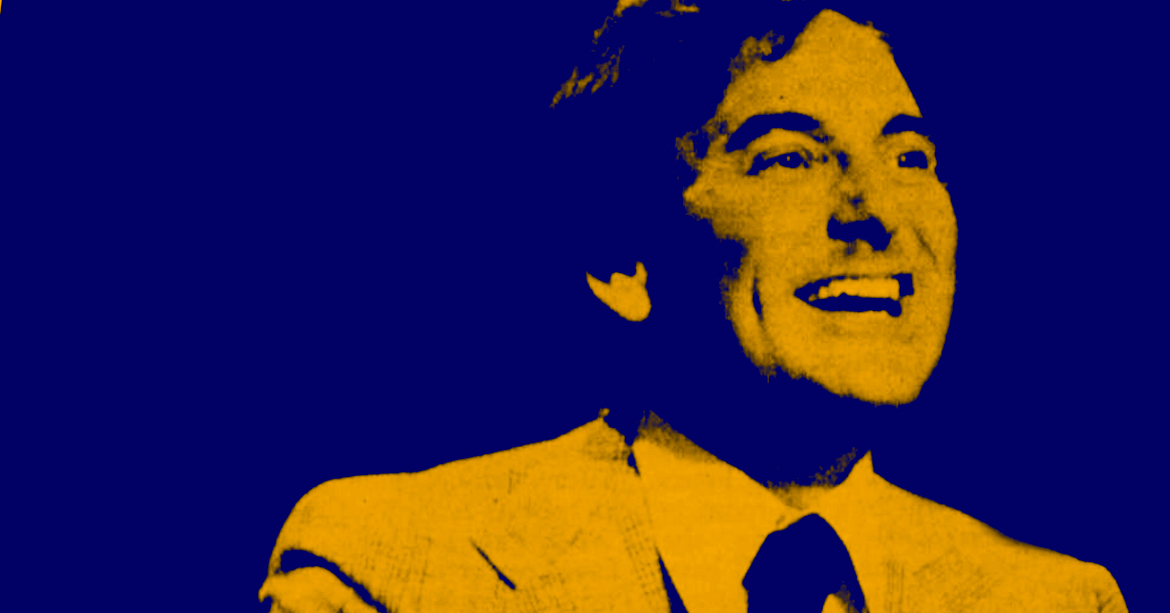Games people play with Monkhouse
Bob Monkhouse talks about his history of game shows as he prepares for a series of Celebrity Squares in 1975

If Bob Monkhouse makes all the complications of Celebrity Squares look easy, it’s only because of his 23 years’ experience in the Game game, including presiding over some of television’s most monumental disasters. The story goes back to his first-ever panel show in 1952.

“It was called Why?” says Monkhouse, “a question on the lips of every viewer after watching it. It was so complicated that when they scrapped it people still didn’t know what the rules were.”
Then came What’s My Line?, the panel game which created the biggest impact in the Fifties. Monkhouse was a resident panellist for two years.
“It was such a cult that, if you did anything remotely unusual, it was bound to get into the newspapers,” he says. “The supposedly cantankerous Gilbert Harding once gesticulated angrily and accidentally poked me in the eye. The producer decided it would be an amusing gimmick to wear an eye patch on the next show. I did so — and we made headlines in four national papers the next day.” By this time, Monkhouse was building a reputation as a quick-fire ad-libber, one of the few comic entertainers happy to face the cameras — then mostly live — without a script. On one occasion, he inadvertently demonstrated the lack of polish of some of his contemporaries when he appeared in I’ve Got A Secret.
“My ‘secret’ was that I would walk out every time someone said ‘um’ or ‘er’. I was suffering from chronic exhaustion by the time they guessed. Such verbal hesitation wouldn’t be tolerated these days. Still, we shouldn’t be hard on those panel pioneers. After all, to ’er is human.”
He next became chairman of Do You Trust Your Wife?, in which the husband received £10 for replying correctly to a question or, if he couldn’t and passed it to his wife, she earned £20 for a correct answer. No one knows how many marriages broke up under the strain, but for Monkhouse it led naturally to the next game series, Bury Your Hatchet.
“I co-invented it,” he explains, “and it was dreadful. It should have been buried with the hatchet. It was replete with every possible yawnmaking gimmick, from a sin-bin — a forfeit-type feature — to toy hatchet prizes. Fortunately, we filmed it in advance, so we could edit out the worst excesses. But I’ve seen better film on dirty teeth.
“The idea was to invite people who had fallen out to win money for one another by answering questions. It sounds like a satire on a game show now. Understandably, the collected wrath of the viewers had us taken off the air ahead of schedule.”
But not before Monkhouse had tried to breathe life into it with yet another version of the old eye patch gag.
“A lady wrestler came on claiming to have a grudge against her husband who was a boxer,” says Monkhouse. “So we invited the late Freddie Mills, the boxing champion, to act as ‘referee’ and try to talk them into a reconciliation. Freddie only succeeded in making things worse and it began to look a bit ugly. The lady took a swipe at him and in defending himself Freddie hit me in the eye with his elbow — the same eye that Gilbert Harding had poked. I thought that was marvellous and wore a patch on the next show. But such was our status that we didn’t even get a mention in the Press.”
Monkhouse redeemed his reputation with For Love Or Money, which had the same format as Sale of the Century, except contestants were not aware of how much money they were winning until the end.
“It was during that show’s two-year run that I developed my technique,” says Monkhouse. “I started sprinkling jokes throughout the series, creating a frivolous atmosphere which didn’t stretch or disturb the viewers. It simply allowed them to relax, sit back and let their brains hang out — as undemanding an amusement as a fairground side show.”
In the mid-Sixties, Monkhouse compered Sunday Night at the London Palladium, steering it back to the top of the ratings. So great was his success, particularly with the Beat the Clock audience participation feature, that he was almost sure they would select him for a new game called The Golden Shot.
“I was cracked up when they gave it to Jackie Rae — until I saw it,” he says. “In spite of Jackie’s considerable skill and charm, the format was so rigid and mechanical that he was stifled. They offered it to me when Jackie left and I agreed, on condition they changed the format. But little did I know the other perils which faced me.”
At that time, the show was transmitted live from an old, almost obsolete studio.
“Cameras broke down, targets disintegrated and bolts wouldn’t bolt,” he recalls. “In one show, two contestants were locked in the soundproof box and still stuck there after the commercial break, so we had to commandeer two new volunteers from the audience. Then there was the case of Mrs. Moss and Mr. Plugget, who failed to turn up after winning their way on to the next week’s show. They’ve been lost ever since. Are you there, Mrs. Moss and Mr. Plugget?”
Monkhouse confesses that those terrifying days were of great and lasting benefit to him.
“Until then, I had been the glib, polished performer with the metallic finish, never stuck for an answer. But for the first time in my life, as the studio fell apart around my ears, I was lost for words and my smart-alec image began to disappear, thank God.
“It was The Golden Shot series that provided me with the security and stability I needed through a bad time of my life, the period when my divorce was going through,” he says. “But professionally I needed to stretch myself in other directions.”
The acting talent he had displayed in straight television plays during the Sixties had been neglected during his panel game period. But drama producers insisted his image would interfere with the realism of their plays and there was little demand for Monkhouse the actor.
Then came the challenge of Sunday’s Celebrity Squares, the spectacular noughts-and-crosses game imported from America, where it has been phenomenally successful for nine years.
“It’s a juggling act of most of the things I can do,” says Bob Monkhouse. “I have to make the contestants comfortable and relaxed, keep the nine panellists happy and mentally stimulated, explain the rules without boring anyone or losing pace; I have to watch for the panellists’ flashing lights, select the appropriate questions for each of them, keep everyone up to date as we progress, do my ad-lib solo spot, keep the score… and try to entertain.
“That’s the name of the game — whatever it’s called…”
About the author
David Block is a journalist and feature writer who writes personal profiles and travel guides for major magazines and newspapers




